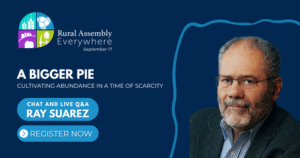The Federal Communications Commission (FCC) wants to modernize the Lifeline program by including funding support for Internet services to underserved and unserved communities. Prior to the Universal Service Fund, millions of people went without basic landline communication services. In 1985, Lifeline was created to provide discounted landline service to qualifying low-income communities. In 2005, Lifeline was extended to wireless telephone services. Ten years later, 53% of Americans living in rural areas and 63% living on Tribal lands do not have access to high-speed broadband.
The Rural Broadband Policy Group commends the Commission in its efforts to ensure that all Americans have access to affordable, quality broadband that enhances their lives and helps them emerge from poverty. Lifeline Modernization is one of the most meaningful proceedings the Commission has tackled in recent years – it has the potential to help the most vulnerable members of our society to improve their lives.
The following statement can be attributed to Danielle King, Coordinator of the Rural Broadband Policy Group:
“Historically, rural and Tribal communities are constantly riddled with economic hardship. But with the unique design of the Lifeline program focused on the individual, cost barriers will no longer be an issue that prevents rural, poor communities to carry out basic needs of survival.
“Modernizing the Internet will enable rural, poor people to apply for jobs, complete scholarships for college, and lastly monitor health care delivery online—essential tools to participate in the 21st century. The Internet, for rural residents has the capacity to dictate if there is a solid plan for future generations. The Internet has potential to create social and economic opportunities which can give Millennials, and soon, Generation Z, a great reason to stay or come back to rural America.
“Lifeline represents the human element of the digital divide. Once a community and its institutions – hospitals, libraries, and schools – have access to the Internet, the last connection to make is to the individual, in their home.
“Lifeline Modernization, at its core, is about building an inclusive nation where all can access education, healthcare, economic opportunity, and full participation in society.
“The day has finally come when closing the digital divide is not a dream of one, but a reality for many.”
On August 31, the FCC received comments from organizations and individuals about including Internet in Lifeline.
Please listen to how rural residents could benefit from the Modernization of Lifeline:
- Jessica Beer, Small Business Owner
- Bill Richardson, Richardson Associates Architects
- Ada Smith, Appalshop’s Institutional Development Director







